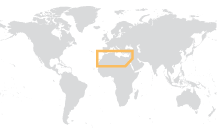Modernisation of payment systems in the Mediterranean: FEMIP delivers
The EUR 3 million loan made at the end of 2009 to an Egyptian company specialising in the automation of payment processes confirms the EIB's desire to help the Mediterranean countries accelerate their economic and social modernisation. In this area the EIB, via its financial arm in the Mediterranean, FEMIP is playing a pioneering role and the success of this pilot project is likely to inspire many other countries in the region to follow this example of technological renewal as a major lever for their development.
The payments transmission process, the key to development
Like other Mediterranean countries, Egypt remains a society characterised by both the restricted nature of its banking sector (only 10% of Egyptians have a bank account) and the persistence of a system of monetary exchanges based almost exclusively on paper money, which is used in 97% of transactions.
To switch from a payments system based on paper money to an automated system based on bank money would thus release a tremendous reservoir of growth, both microeconomic and macroeconomic. That is precisely the intention of GiroNil, a joint venture established in 2005 by the main domestic banks, both public and private, and other major public companies thanks to the impetus provided by the Dutch firm Inclusion Group, which promoted this idea with the Egyptian authorities. Inclusion Group, which specialises in the automated collection of payments on behalf of banking entities has granted GiroNil an operating licence that will enable it to use its expertise in automation procedures and software in Egypt, in order to create a fully automated nationwide payments system infrastructure.
On the strength of this transfer of know-how and technology but also of good management practices, GiroNil therefore ultimately aims to set up a common platform that will enable automated transfers to take place between all kinds of economic agents. The same infrastructure would be used by banks, insurance companies, businesses and individuals, and would have the advantage of simplifying, speeding up and increasing the number of transactions. Since it was set up, GiroNil has already designed bespoke solutions for various clients, both SMEs (which outsource to it the management of their payment systems) and ministries (for which it automates the payment of civil servants' salaries). Its target is to achieve 130 million transactions a year by 2015 and to cover 20 million accounts.
A flagship project for exponential progress
By providing GiroNil with a convertible participating loan, FEMIP has reaffirmed the crucial focus of all its investments in the Mediterranean partner countries: their development. The fact that this is the first loan in the field of automated payments serves to demonstrate the exemplary nature of this operation. The EIB has chosen this project for its potential in terms of economic and social modernisation: the launching of an automated payments system will enable banks to effectively fulfil their role as intermediaries and, above all, as financiers of the economy by mobilising the deposits collected. Once the common platform is used by all economic agents, it could also eventually create jobs, ensure that foreign currency transfers by non-residents are secure and encourage e-commerce to take off by gradually promoting the development of online purchases.
For all these reasons, the GiroNil project is expected, once it reaches maturity, to give a substantial boost to Egypt's GDP growth. However, the development backed by FEMIP is not of a purely economic nature; it is also social, as such an undertaking by definition enables a whole host of people who were previously excluded to be integrated into the financial system. Those on low incomes would thus be able to have easier access to basic financial services, to save and also to take out loans: they would therefore be able, thanks to GiroNil, to manage their own financial assets independently. In this way, economic inclusion would be a way of reducing social inequality.
FEMIP's role: credibility, signalling effect and serving as a model for others
Through this quasi-equity operation, FEMIP is sending out a clear signal to all investors in emerging countries, as GiroNil is not, according to the Bank's projections, expected to break even until 2012 - a necessary consequence of its economic model, based, as it is, on volume via a fee charged on each transaction. The EUR 3 million convertible participating loan is thus a bespoke solution for developing GiroNil, enabling it to attain maturity while at the same time continuing to finalise its platform. Once this has been achieved, the profits are expected to prove exponential.
The EIB's credibility lends its full weight to this operation: by demonstrating to institutional investors that it is possible to generate a very high return on an investment that is initially unprofitable this project should encourage others to emulate it. And that is precisely FEMIP's intention: that the success of GiroNil, a pilot project in this area, should spread to numerous other partner countries, in order to unleash the development potential of those countries.

